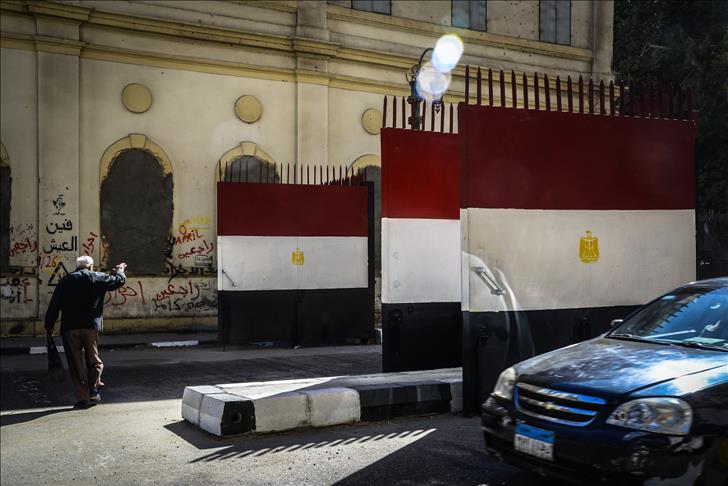
By Amr Emam
CAIRO
One motorist called it the "Tahrir Square Border Crossing." Another described it as the "Separation Barrier." And a third expressed fear that the authorities might soon impose fees on all vehicles passing through the new iron gate erected at the entrance of Cairo's premier protest venue.
"These people [government officials] only want to make our lives more difficult," taxi driver Yasser Mohamed told Anadolu Agency. "Are they this afraid of the people?"
Cairenes woke up last week to find a massive iron gate blocking the entrance to Tahrir Square from the adjacent Qasr Aini Street.
Roughly two and a half meters high, the new gate separates the flashpoint square from a battery of government buildings, including parliament, cabinet headquarters and the health, housing, education and scientific research ministries.
The area also houses the US and British embassies, along with several local and foreign banks.
The new gate has two openings to allow vehicles from the oft-crowded Qasr Aini Street into Tahrir. On both sides of these, pedestrians make their way through smaller gates.
The gate – painted in the red, white and black of the Egyptian flag – replaces an enormous concrete barrier erected at the height of Egypt's post-uprising turbulence in late 2011.
Anger
Pedestrians now must line up to pass through the gates to reach the nearby Mugammaa Tahrir, a socialist-era structure that serves as the capital's bureaucratic nerve center, or the Health Ministry, from which Egyptians wanting to work in the Gulf must obtain clean bills of health.
One pedestrian glared at the gate after crossing through it, muttering to himself angrily under his breath.
"Tahrir Square should be included in the Guinness Book of World Records as the world's first gated public square," one woman, rushing to work, said sarcastically.
"Why not impose fees to cross?" another woman half-joked.
Taxi driver Mohamed, for his part, thinks the government plans do just that.
"I'm not kidding – the government may soon start charging us to cross," he said.
"Poor citizens like us end up paying for the mistakes that government officials make in their air-conditioned offices," he fumed.
Ahmed Sayed, a 27-year-old computer specialist, said he understood the government's security concerns – particularly in light of repeated bloody clashes in the area over the past three years.
Sayed noted that in recent years demonstrators – from activists protesting police brutality, to civil servants demanding better pay, to university graduates demanding jobs – had been coming to the area to air their grievances.
"The government should address the root causes of the people's anger, not build walls and fences around itself, further alienating itself from the people," Sayed told AA.
englishnews@aa.com.tr
Anadolu Agency website contains only a portion of the news stories offered to subscribers in the AA News Broadcasting System (HAS), and in summarized form. Please contact us for subscription options.

